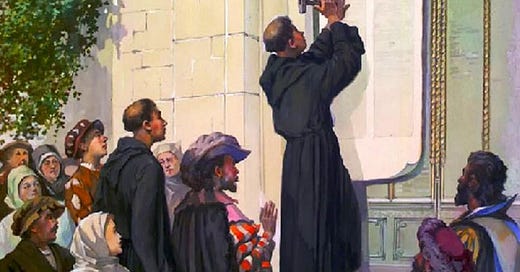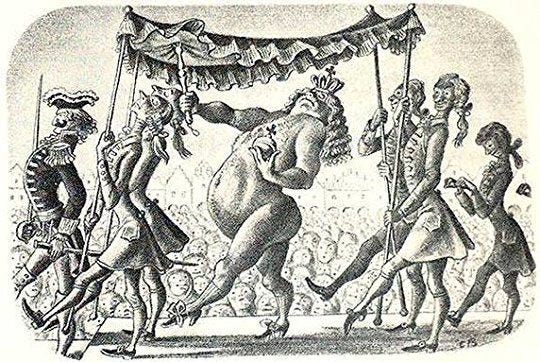Make someone’s day: Gift a subscription to your friends and family!
On October 31, 1517, a little-known dissident Catholic monk committed an act of heresy. That monk was named Martin Luther.
Outraged by how the Catholic church’s moral foundation had been warped by its desire for political power, Martin Luther nailed a pamphlet on the door of All Saints’ Church in Wittenberg. What came to be known as the “Ninety-five Theses” should have led Martin Luther to be burned at the stake.
Martin Luther nailing a pamphlet on a church door should have been a minor event known only to religious historians. But due to a confluence of subsequent events, the Ninety-five Theses shook the very foundations of European moral and political order.
Martin Luther’s defiant act led to the Protestant Reformation, the birth of dozens of new Protestant sects, and 130 years of religious strife throughout the European continent. It was only with the Peace of Westphalia in 1648 that Europe returned to some sort of stability. The treaty essentially froze the religious conflict and enabled sovereigns to determine the dominant religion with their borders. But by that time Northern Europe’s moral and political order had been remade.
Today, I believe we live in a similar situation, but the ideas that we struggle over are very different.
Human societies need world views
All human societies have had some sort of a worldview, whether it be a religion or an ideology, that binds together society. In pre-modern societies, that world view was invariably a religion.
Religions:
Determine what is moral and immoral
Explain the unexplainable
Give meaning to people’s lives
Create a shared identity with others.
Project an image of morality to others within their group to ease cooperation via:
Dress, jewelry, hairstyle
Mannerism
Rituals
Terminology.
In addition, many social psychologists, including Jonathan Haidt in his book “The Righteous Mind” point out that religions and ideologies play other important roles:
Enabling humans to believe they are moral.
(more importantly) Enabling humans to project an image of being moral to others so that others are willing to cooperate with them in groups.
Give people a common identity that enables cooperation within larger groups.
The upper classes often captured that worldview in order to justify their rule. They used taxes and forced labor to construct fantastic pyramids, temples, cathedrals, and churches to venerate their gods but also to legitimize their own power by creating a perception of a direct link between themselves and their gods.
The upper classes rarely create a religion. Religions come from below. The upper class, however, usually capture it and use the religion for their own purposes.
Ideology has substituted for religion
Today in wealthy Western nations, ideologies typically play that role. Since the French Revolution in 1789, Left-of-Center ideologies have been on the march demanding Equality for its people. For most of the period since, the political support for the Left has come from workers, farmers, the poor, or other people with below-average income, wealth, and social status.
I believe the moral foundation of all Left-of-Center ideologies is based to a large extent on the following assumptions:
The quest for Equality is the prime moral goal.
A state of Equality is a sign of a just society. A state of Inequality is a sign of an unjust society.But everywhere in material reality, one sees rampant Inequality.
Those inequalities are because someone (or some institution) did something bad to the less fortunate who have less. Those bad actions may have been done in the past, or they might still be going on in the present.
It is the moral duty of all caring people to take a stand against that Inequality and rectify it, by:
Using the power of the government to create a state of Equality, or, at the very least, make important strides towards that goal within our lifetime.
Almost every social program initiated by supporters of Left-of-Center ideologies starts with identifying an inequality, declaring it a moral outrage that must be eliminated by the government.The morality of a person should largely be judged by the extent to which that person publicly embraces the above principles. This is where the ideology most resembles a faith-based religion. Morality is not determined by individual action but by one’s stated beliefs.
Because all the above is self-evident, anyone who does not publicly embrace the above principles is either uninformed, ignorant, immoral, corrupt, or stupid. An intelligent, informed, and moral person could not possibly have a fundamentally different viewpoint.
The fundamental problem is that the Left-of-Center ideologies of the Left cannot produce the results that they claim are their desired aim: Equality. This creates what I call The Central Moral Dilemma of the Left.
The Central Moral Dilemma of Left-of-Center ideologies is an irresolvable moral conflict between:
What the Left deems to be their prime moral goal (Equality), and:
What the Left has actually achieved and what it can possibly achieve in the material world.
The Upper Class has captured Left-of-Center ideologies
Starting in the late 1960s and accelerating radically since about 2010, the social basis of Left-of-Center ideologies has radically shifted. Left-of-Center ideologies have become the dominant world view of the Western-educated classes. While before 1965 ideologies of the Left had been the domain of the working class, now they are the domain of the professional class.
Just like with the Catholic church in a previous era, the entry of this ideology into the corridors of power corrupted the original intentions of the world view. The goal of power has often taken a higher level of importance than the goal of creating equality.
Since the 1960s, and particularly since 2010, we have seen the dramatic growth of support for Left-of-Center ideologies by college-educated members of the upper class. Those members have gradually corrupted the original goals away from fighting against the upper class to justifying the power of the upper class.
Instead, those ideologies have been the means by which college-educated Western people:
Convince themselves that they are caring and compassionate people.
Project an image to others that they are caring and compassionate people.
Denote that they are intelligent, educated, and a deserving member of the professional class.
In other words, the ideologies of the Left are now largely public relations for the affluent. Ironically, the ideologies that are supposed to create Equality have become social markers that perpetuate Social Inequality.
Left-of-Center parties in the 21st Century have the following functions:
To make highly educated people feel caring and compassionate without having to actually have to do anything (because their agency has been outsourced to the government).
To spend trillions of dollars per year in an effort to get the rest of society to vote for them out of material interest. This is political patronage that enables the first goal to be implemented. In other words, the stated goal of the policy is not the actual goal. It is about the distribution of material resources to those who are loyal.
Upper classes often capture that worldview in order to justify their rule.
Just as the pyramids, temples, cathedrals, and churches of the past were built to satisfy the moral cravings of the upper class, so is the government social programs performing the same role today.
We need a new Reformation that completely overhauls the ideologies of the Left and rebuilds them on a solid moral foundation. We need a new Martin Luther. If no one else will step forward, I will do so.
See also my other articles and podcasts on Ideology:
Why Ideologies Threaten Progress (Part 1 of 3-part podcast series)
Why ideologies fail (podcast)
Descent into a man-made Hell: Understanding modern Totalitarianism
You might also be interested in reading my “From Poverty to Progress” book series:
So what did Martin Luther want?
Martin Luther wanted to return to what he perceived to be the old Christian church before Roman Emperor Constantine made Christianity the official religion of the Roman Empire. The long-term result of this edict was to transform Christianity into a massive bureaucracy that spent as much time scheming with rulers as saving souls.
Throughout the Medieval period that followed, the Catholic Church experienced a struggle between the:
The Church of God, those who joined the Church out of religious conviction, and
The Church of Power, those who joined the Church as they saw it as a means to increase their own status and political power.
Over time, The Church of Power began to dominate.
Martin Luther believed that the Church should be purged of its worldly quest for Power to become once again The Church of God. Luther wanted the Church to behave as it did (or as he thought it did) before it became a powerbase within the Roman Empire and Medieval Europe. Luther believed that each of the faithful should read the Bible in their own language so they could interpret the Word of God in their own way without priests interpreting it for them.
Martin Luther was simultaneously a radical and a reactionary.
But we must reject the goal of Equality
This is where the Martin Luther parallel begins to fall apart. My goal for Left-of-Center ideologies differs somewhat from what Martin Luther wanted for Christianity in 1517.
Whereas Martin Luther wanted to return to his idealized version of early Christianity (i.e. return to the roots), I believe that supporters of Left-of-Center ideologies need to fundamentally rethink their goals. The original assumption that Equality should be the goal must be rejected.
The goal must be updated to help those who have less. Equality cannot achieve that.
I believe that those who uphold Left-of-Center ideologies need to question their moral goal of Equality. It is this central moral assumption that is at the heart of where Left-of-Center ideologies have gone wrong for the last two centuries.
As I have written in previous articles:
The goal of Equality is impossible to achieve (beyond Equality of Legal Rights and a certain Social Equality that gives respect for all people regardless of their social rank). With the exception of Hunter-Gather societies, every human society that has ever existed has had rampant levels of inequality.
In over 200 years of trying, no Left-of-Center government has ever created enough Equality to satisfy its followers. All those failures, however, are just seen as justification to push harder.
Modern societies that are more egalitarian today, for example, Scandinavia, were far more egalitarian long before the Left-of-Center government implemented their policies. Lower levels of inequality and cultural diversity in Scandinavia enabled the growth of a large welfare state, not vice versa. Those Scandinavian nations fund their social programs with high taxes on workers with average and below-average income. So the modern welfare state is mainly substituting individual consumption with government consumption, not Inequality with Equality.
Even Communist regimes that supposedly created a more egalitarian society just substituted one form of inequality (income) for another form of inequality (rank within the ruling party).
Efforts to create Equality cause far more damage to society than benefits because it is far easier to tear down the successful than it is to lift up the less fortunate. To the extent that we can uplift the less fortunate, then there is no need to tear down the successful.
I am sure that many supporters of Left-of-Center ideologies would say that my overt rejection of the goal of Equality is callous and cold-hearted. It is lacking in compassion for those who have less.
But rejecting the goal of Equality does not mean rejecting the goal of helping those who have less. It is merely replacing an unachievable goal with a goal that that has proven very achievable.
It is a false assumption that the only way that we can help those who have less is by creating greater Equality. There are other means that are far more effective, and the history of material progress proves it:
Long-term economic growth does far more to uplift the working class, poor, women, and racial minorities than government redistribution. One big exception is likely redistribution to the elderly with pensions and health care. But if we focus on working-age adults, long-term economic growth achieves far more results than government redistribution. And if working-age adults increase in their material standard of living, then they can make the material standard of living of their children much better. And long-term economic growth also increases the material standard of living of retirees as well (although probably less than government-funded pensions and health care).
While long-term economic growth enables the working class, poor, women, and racial minorities to have a higher material standard of living, it is not sufficient by itself. Individuals also need to make Life Choices when they are youths (roughly age 14-29) that enable them to participate in the material progress that surrounds them.
No amount of government redistribution (except for the elderly) can possibly make up for a lack of:
Long-term economic growth (which comes from society, not the government)
Youths making wise Life Choices.
Many, if not most, government programs and values favored by those who uphold Left-of-Center ideologies undermine long-term economic growth and youths making wise Life Choices by creating perverse incentives. So the Left-of-Center ideologies not only fail to achieve their desired goal, but they also hurt the very people that they claim to be trying to help.
Supporters of Left-of-Center ideologies refuse to acknowledge all the above because of the very strong psychological benefits that they receive from perceiving themselves as moral and projecting that image to others. In other words, it is moral self-indulgence disguised as virtue.
In short, the goal should be Material Progress and Upward Mobility, not Equality. Unlike Equality, those goals are achievable and moral.
The alternative for Left-of-Center ideologies is that working-class and poor voters will increasingly abandon them as it becomes clear that their purpose is really to promote the moral legitimacy and psychological well-being of the upper class.
But this requires moral sacrifice
The main disadvantage of making Progress and Upward Mobility the goal is that it does not place those who support Left-of-Center ideologies as being more moral than the rest of us. This is a big deal, because it gets to the heart of what makes Left-of-Center ideologies so attractive to people.
If the Left focused on achievable goals that actually helped the disadvantaged, they could make a real difference, but that means giving up their claim to a higher morality.
In other words, supporters of Left-of-Center ideology need to have the Honesty and Moral Courage to admit that the Emperor Has No Clothes. Supporters of Left-of-Center ideology must choose between:
The psychological benefits that they receive from their beliefs, and
Helping the very people that they claim to be trying to help.
Will they?
See also my other articles and podcasts on Ideology:
Why Ideologies Threaten Progress (Part 1 of 3-part podcast series)
Why ideologies fail (podcast)
Descent into a man-made Hell: Understanding modern Totalitarianism
You might also be interested in reading my “From Poverty to Progress” book series:













Do you think academic and intellectual elites should/will abandon their fixation on equality or the more populous under class should/will do so first . A political and academic elite focused on promoting economic growth would help lower class people abandon some of their resentments and focus on their individual abilities to improve their lives. But since incentives don't align with that goal could the reverse happen, and people who are fixated on inequality slowly lose their prestige and are forced to change course to regain the public's trust